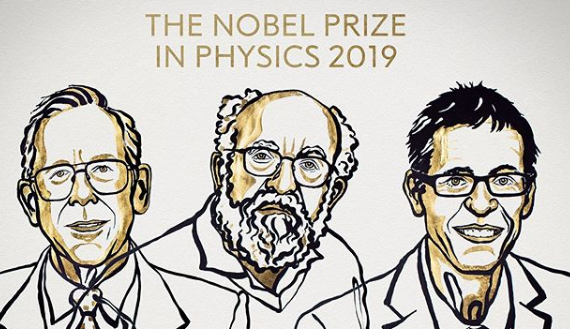
Την εβδομάδα αυτή γίνονται οι ανακοινώσεις για τους νικητές των βραβείων Νόμπελ. Σήμερα, ανακοινώθηκε σε ποιους θα δοθεί το Νόμπελ Φυσικής 2019.
Αυτοί είναι οι κοσμολόγοι Τζέιμς Πιμπλς, Μισέλ Μαγιόρ και Ντιντιέ Κελόζ που θα τιμηθούν με το βραβείο αυτό για την πρωτοποριακή τους εργασία στον τομέα της αστροφυσικής. Η επιτροπή που απονέμει το βραβείο έκανε τη σχετική ανακοίνωση μέσα από τους προσωπικούς της λογαριασμούς στα μέσα κοινωνικής δικτύωσης.
Ο Πίμπλς τιμήθηκε με το μισό βραβείο και το άλλο μισό μοιράζονται οι Μαγιόρ και Κελόζ. Αξίζει να σημειωθεί ότι το βραβείο συνοδεύεται από χρηματικό έπαθλο 910.000 δολαρίων.
Οι θεωρητικές αποκαλύψεις του Τζέιμς Πιμπλς συμβάλλουν στην κατανόηση του πώς εξελίχθηκε το διάστημα μετά το Μπιγκ Μπάνγκ, ενώ οι Μαγιόρ και Κελόζ εξερεύνησαν τις γειτονικές στη Γη περιοχές του διαστήματος σε μια προσπάθεια να ανακαλύψουν άγνωστους, μέχρι σήμερα, πλανήτες. Αυτό τους οδήγησε στο να ανακαλύψουν έναν εξωπλανήτη που κινείται σε τροχιά γύρω από ένα αστέρι ηλιακού τύπου.
Η Σουηδική Βασιλική Ακαδημία Επιστημών δήλωσε ότι οι φετινοί νικητές άλλαξαν τον τρόπο με τον οποίο σκεφτόμαστε για το σύμπαν. Μάλιστα, υποστηρίζει ότι οι ανακαλύψεις τους αλλάζουν οριστικά τον τρόπο με τον οποίο αντιλαμβανόμαστε το σύμπαν.
Δες ακόμα: Νόμπελ Ιατρικής 2019: Αυτοί είναι οι τρεις επιστήμονες που θα τιμηθούν με το βραβείο
JOBS
Χιλιάδες Θέσεις Εργασίας σε όλη την Ελλάδα
Πωλήσεις
Πλήρης Απασχόληση
18-12-2023
Χαλάνδρι
1.500
Πωλήσεις
Πλήρης Απασχόληση
06-03-2024
Αθήνα
1.000

